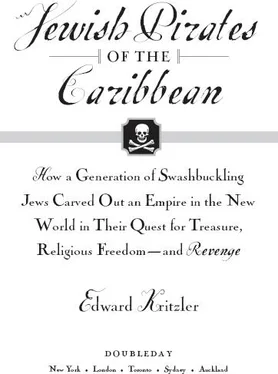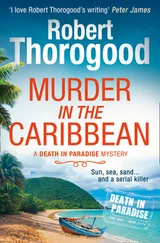Edward Kritzler - Jewish Pirates of the Caribbean
Здесь есть возможность читать онлайн «Edward Kritzler - Jewish Pirates of the Caribbean» весь текст электронной книги совершенно бесплатно (целиком полную версию без сокращений). В некоторых случаях можно слушать аудио, скачать через торрент в формате fb2 и присутствует краткое содержание. Год выпуска: 2008, ISBN: 2008, Издательство: Knopf Doubleday Publishing Group, Жанр: Старинная литература, на английском языке. Описание произведения, (предисловие) а так же отзывы посетителей доступны на портале библиотеки ЛибКат.
- Название:Jewish Pirates of the Caribbean
- Автор:
- Издательство:Knopf Doubleday Publishing Group
- Жанр:
- Год:2008
- ISBN:9780385528368
- Рейтинг книги:3 / 5. Голосов: 1
-
Избранное:Добавить в избранное
- Отзывы:
-
Ваша оценка:
- 60
- 1
- 2
- 3
- 4
- 5
Jewish Pirates of the Caribbean: краткое содержание, описание и аннотация
Предлагаем к чтению аннотацию, описание, краткое содержание или предисловие (зависит от того, что написал сам автор книги «Jewish Pirates of the Caribbean»). Если вы не нашли необходимую информацию о книге — напишите в комментариях, мы постараемся отыскать её.
Jewish Pirates of the Caribbean — читать онлайн бесплатно полную книгу (весь текст) целиком
Ниже представлен текст книги, разбитый по страницам. Система сохранения места последней прочитанной страницы, позволяет с удобством читать онлайн бесплатно книгу «Jewish Pirates of the Caribbean», без необходимости каждый раз заново искать на чём Вы остановились. Поставьте закладку, и сможете в любой момент перейти на страницу, на которой закончили чтение.
Интервал:
Закладка:
A precedent for this unholy alliance was set by fellow Sephardim in North Africa who had assured their welcome among the Moors by profitably backing and sometimes leading the Barbary pirates. Sinan, Barbarossa’s second in command, was referred to in Crown correspondence with England’s Henry VII as “the Great Jewish pirate,” and the brothers Samuel and Joseph Palache would go from commanding pirates to founding Amsterdam’s Jewish community.
In the first decades of the seventeenth century, rival Christian merchants wanting a share of the fabulous wealth being generated by trade in the New World sought to expose the conversos as heretics before the Holy Office of the Inquisition. Thus threatened, covert Jews, beginning in the 1620s, conspired with Holland and England to seize a New World colony. Writing in code to agents in Europe, they proposed to serve as a fifth column in the body of the enemy. “They are good and useful spies,” said a confidant of Oliver Cromwell, regarding the Jews who advised Cromwell in the conquest of Jamaica. 2
Positioned to assist Spain’s enemies, they did. Jewish trade links, cultivated since 1492, when Sephardim settled the far corners of the globe, doubled as a worldwide intelligence network. From the time Jews in Portugal got word to Queen Elizabeth that the Armada was sailing, they shared secret intelligence with the enemies of Spain.
Jews had been outlawed from living in France since 1394 and from England since 1290. However, when those two nations and Holland settled a dozen small, uninhabited Caribbean islands between 1624 and 1635, Jews were welcome. Their connections and knowledge of New World trade were indispensable to the success of the new colonies. And they spoke the language. Who else but Sephardic merchants could better pursue illegal trade with the Spanish colonies? How else could these small settlements survive? The islands constituted mere footholds in what was called the New Spanish Sea. Together they totaled less than 1,500 square miles, while the Spanish New World encompassed millions.
The first openly Jewish settlement in the New World was in Brazil. In 1624, the Dutch captured Brazil’s capital, Bahia, from Portugal with an invasion force that included “several dozen declared Jews.” The invaders were assisted by local conversos who had gotten word that an Inquisition office was to be established in their province, where two hundred of them were living as counterfeit Christians. A year later, King Philip IV of Spain sent a twelve-thousand-man army and temporarily threw the Dutch out. Afterward, the Inquisitor’s report charged: “[Secret Jews] had written Holland and asked the Dutch to liberate them…had initiated plans for the invasion and agreed to share its costs. [The] Heretics had suckled at the breast of the Mother Church [and when the Dutch came]…openly professed the Jewish faith.” 3
In 1630, Holland’s forces again invaded. Landing north of Bahia, they conquered Recife and surrounding provinces in northeast Brazil. Under Dutch protection, a Jewish community thrived there for twenty-four years. They called their congregation Zur Israel (Rock of Israel), marketed sugar, and taxed Jewish privateers 3 percent of their booty. Sugar and piracy transformed Recife into the richest trading port in the New World outside of Havana, and Jews, integral participants in both industries, lived a high life. Their favorite pastimes may be glimpsed from what they outlawed: Synagogue leaders banned card playing on Friday afternoon (as too many members missed Sabbath service), and levied whopping fines on members caught taking Christian women into the mikvah , the ritual bath.
The situation in Brazil was unique. Elsewhere in the New World, as the midcentury approached, the long-established secret Jewish communities in Peru and Mexico came to a flaming end, with each found guilty of a “great conspiracy.” In 1638, hundreds of Peru’s Jews were arrested. Their leaders, accused of plotting to blow up Lima’s harbor in advance of a Dutch invasion, were burned at the stake. In the 1640s, Mexico’s Jews were charged with conspiring to burn down the House of the Inquisition, and by 1650 the methods of the Inquisition—the dungeon, the rack, and the stake—marked a decade-long succession of autos-da-fé that decimated the Mexican community. In both countries, the heretics’ wealth was equally divided between the Crown and the Inquisitors, and their property was auctioned off to Old Christians.
In 1654, a similar end threatened the congregants of the Rock of Israel when Portugal reconquered Recife. After twenty-four years, the only legal Jewish community in the New World was no more. Jews were given three months to leave or be turned over to the Inquisition. The destruction of brethren communities in Mexico and Peru convinced the refugees the New World was again off-limits. They departed Recife on sixteen ships: The fifteen that sailed for Holland arrived safely; the ship that went north to New Amsterdam did not.
This ship ran into a storm that, “by the adverse,” drove it into Jamaica’s enemy waters, where it was seized. The island was home to a secret Jewish community called “Portugals” who had been living as merchants and traders since Columbus’s son had settled the island in 1510. The Columbus family owned Jamaica and, in deference to their converso settlers, had kept the island out of bounds to the Inquisition. But when the identity of the Dutch refugees became known, Jamaica’s leaders, looking to oust the Columbus family, used the arrival of these “suspect heretics” to invite Inquisitors from Colombia to Jamaica.
Fearing an investigation of the refugees might lead to their own exposure, Jamaica’s Portugals sent a note to Cromwell’s agent: Jamaica could be conquered with little resistance, and they pledged their assistance. The following year, a Jew from Nevis led thirty-six English ships into the harbor, and two local Jews negotiated and signed the peace treaty surrendering the island to England. The treaty exiled the Spanish, and Cromwell invited Jamaica’s Portugals to stay on openly as Jews.
Welcomed by the English, Jews from all over the New World shed their converso cloaks and emigrated to Jamaica. The community soon included shipowners from Mexico and Brazil, traders from Peru and Colombia, and ship captains and pilots from Nevis and Barbados. Together their knowledge of New World trade was unsurpassed. By 1660, Jamaica had become the Jews’ principal haven in the New World. Unlike the small, isolated isles in the eastern Caribbean, Jamaica was a major island in the middle of the shipping lanes, an ideal base from which to strike at Spanish shipping, and well positioned to engage in contraband trade with the Spanish Main.
Soon after the English conquest, Jamaica’s Jews convinced the island’s new leaders that the best way to defend the colony and have it prosper was to invite the pirates of the Caribbean to move there. The Spanish would think twice about attacking Jamaica if its principal port was the home base of the feared buccaneers of the West Indies. In return for a safe harbor, these pirates, the Brethren of the Coast, became Jamaica’s defense force and piracy its principal industry.
In the 1660s, Port Royal, with its wealthy Jewish merchants, shipowners, and synagogue, was known as the “Treasure House of the Indies” for all the booty brought there. Catering to a transient pirate population with one bar and brothel for every eight persons, the pirate capital acquired a reputation as the world’s “wickedest city.” Within fifteen years, pirate raids from Jamaica on the Spanish Main, organized and financed by the merchants of Port Royal, broke the back of the Spanish Empire. In Henry Morgan, the Jews found their Joshua. The buccaneer admiral’s six raids on Spanish ports, culminating in the burning of the “Golden City of Panama,” brought the Spanish Empire to its knees. In the Treaty of Madrid in 1670, Spain acceded to Europe’s right to settle the New World…and Jews were finally free to be Jews.
Читать дальшеИнтервал:
Закладка:
Похожие книги на «Jewish Pirates of the Caribbean»
Представляем Вашему вниманию похожие книги на «Jewish Pirates of the Caribbean» списком для выбора. Мы отобрали схожую по названию и смыслу литературу в надежде предоставить читателям больше вариантов отыскать новые, интересные, ещё непрочитанные произведения.
Обсуждение, отзывы о книге «Jewish Pirates of the Caribbean» и просто собственные мнения читателей. Оставьте ваши комментарии, напишите, что Вы думаете о произведении, его смысле или главных героях. Укажите что конкретно понравилось, а что нет, и почему Вы так считаете.












